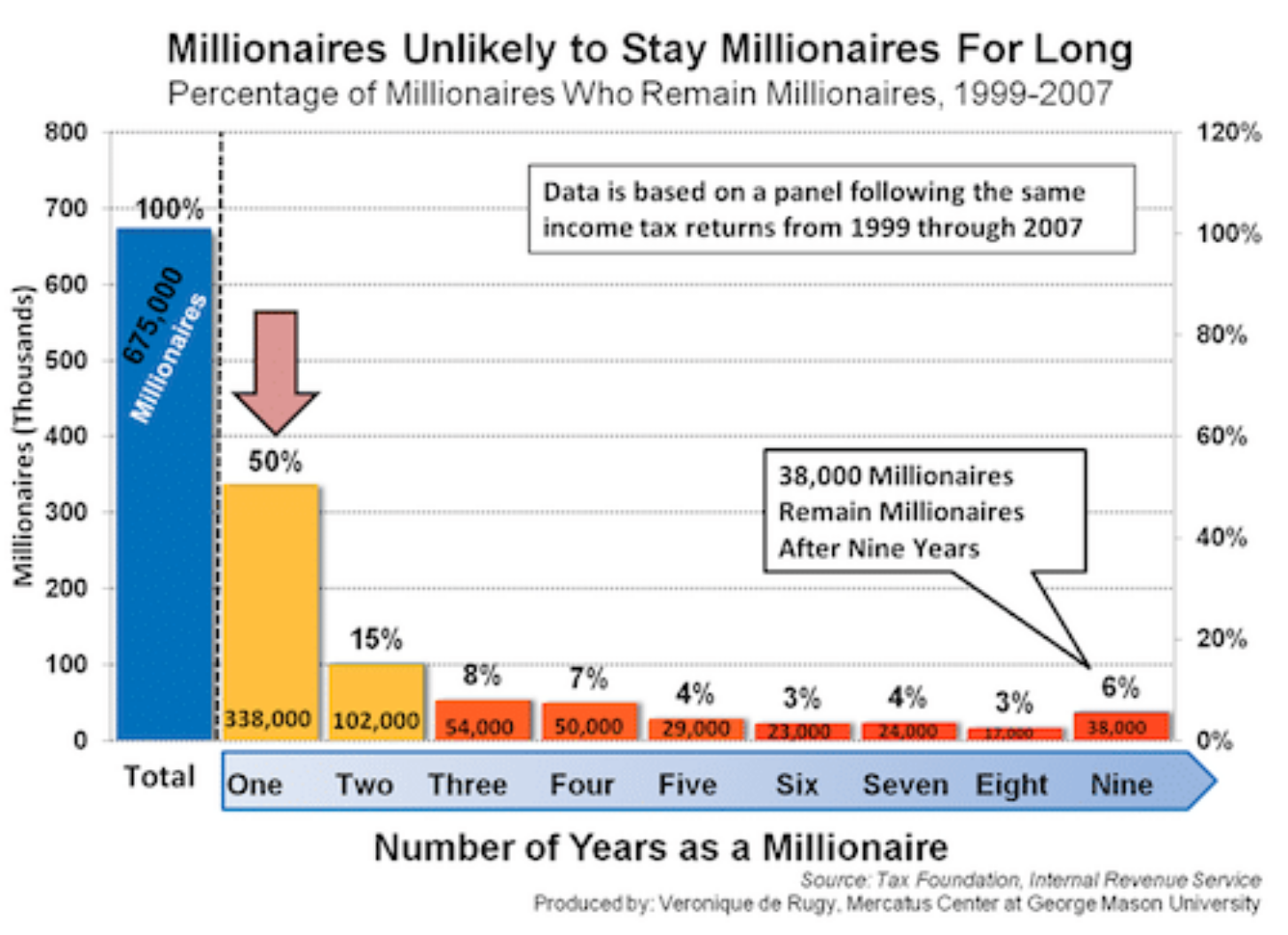

Millionaires – the fat cats who continue to get fatter – are everywhere and they are the problem, dragging down everyone else who is not living their lavish lifestyles with their country clubs and their private educations and their vacation villas and you know, they just keep reproducing like rabbits and shouldn’t we really be doing something about them. Like maybe take their money.
Occupy Anywhere campers would have you believe rich cats are the festering sore of society. Get rid of rich people and then we can address society ills like human waste in city parks.
Those who subscribe to the idea that millionaires undermine the economy and we need wealth redistribution should be overjoyed at a Mercatus Center report that concludes millionaires like everyone else are subject to significant income declines. But this should alarm anyone who is looking to millionaires to “pay their fair share,” whatever that means. Go ask Occupy Anywhere.
This week the Mercatus Center at George Mason University analyzed data from 675,000 real people who filed federal income tax returns annually between 1999 and 2007. Raw data sources are the Tax Foundation and Internal Revenue Service. In all 675,000 cases the person who filed the return earned $1 million per year at some point during those nine tracked years.
Here’s what Mercatus found: Six percent of tax filers who earned a $1 million annual income before taxes at least once still earned at that level after 2007. Another way to illustrate the point: among all 675,000 who filed $1 million income tax returns at least once between 1999 and 2007, just 38,000 earned at least $1 million before taxes at the end of the nine year timeframe. Clearly the other 637,000 were doing a great job of wealth redistribution!
Mercatus Center senior research fellow Veronique de Rugy wrote the report. “What is interesting is millionaire per se signifies something in peoples’ minds, right, they are rich people, but it doesn’t tell you how much you can buy, your standard of living and how much you are taxed,” she said during our conversation this week.
De Rugy said discussion about high income wage earners often confuses million dollar income earners who are in the top 0.17 percent, with the significant backward trend for the highest earning taxpayers. Before the recession you needed to earn $400,000 to achieve top one percent status; now that level is $300,000, a 25 percent decline.
“That’s why ‘Them vs. Us’ is a little shady in a sense because a lot of people would be surprised what the top one percent really represent,” de Rugy said. “There are people moving from the bottom to higher levels, but basically, the millionaires club is not this exclusive club with no rotation. You may be there one year but most people don’t get to stay millionaires for very long, even during good years.”
The Occupy Anywhere argument should not be over whether there are enough million dollar earners and some vague perception they are the problem. Everyone is vulnerable in a turbulent economy. Focusing on a “millionaire” and declaring that he or she is the reason for widespread economic weakness is akin to saying you are mad at the dog that bit your leg after you kicked him in the butt. That makes no sense. Actually, it is fairly stupid.
People at every level have lost steps on the economic ladder. It does not take much for a once well-compensated executive who might have earned $1 million to see his or her annual income decline by half, two-thirds or even more, affecting the family’s economic package, its so-called wealth, and the ability it has to plan for expenses including educations, retirement, health care, aging parents and grown children who move back home for economic reasons.
When you look closely at how most people become millionaires you discover the process is long, taking often a lifetime, and it includes hallmarks such as consistent savings, making wise purchases, home ownership and the ability to resist extravagant spending. All these are good.
Million dollar incomes are not the problem. Absence of economic opportunity is the problem. Say what you want about the ultra-rich, there are few of them. Many became millionaires by working hard and perhaps inheriting money from parents who also worked hard, because that generation did know something about working hard.
We need more millionaires. We need more people who’ve begun anywhere on the economic ladder, worked hard, perhaps contributed great ideas and succeeded immensely. We need more people like the late genius Steve Jobs and fewer people like Occupy Anywhere campers.
We need more people who succeed fabulously, not more who complain because they did not.
